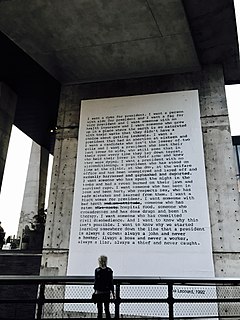A Quote by Hugh Hardy
During the Second World War, nobody built any concert halls or theaters. After the war, Lincoln Center was a very brave project because all those architects had never built a theater before. We've learned a lot since then about the nature of materials and the isolation that's required.
Related Quotes
Because the US has control of the sea. Because the US has built up its wealth. Because the US is the only country in the world really not to have a war fought on its territory since the time of the Civil War ... Therefore we can afford mistakes that would kill other countries. And therefore we can take risks that they can't ... the core answer to why the United States is like this is we didn't fight World War I and World War II and the Cold War here.
I think about my education sometimes. I went to the University of Chicago for awhile after the Second World War. I was a student in the Department of Anthropology. At that time they were teaching that there was absolutely no difference between anybody. They may be teaching that still. Another thing they taught was that no one was ridiculous or bad or disgusting. Shortly before my father died, he said to me, ‘You know – you never wrote a story with a villain in it.’ I told him that was one of the things I learned in college after the war.
In one sense, I have always felt glad to have had the war [World War II] in my childhood, because, as a result, nothing that has happened in the world since then has ever seemed quite so bad. On the other hand, I never entirely got over my feeling of being cheated when the promised era of peace in a wonderful "post-war world" failed to materialize. I could not understand how, after all that, people could ever even think of fighting again. And I still can't.
I have never had illusions about the value of my individual contribution! I realized early that what a man or a woman does is built on what those who have gone before have done, that its real value depends on making the matter in hand a little clearer, a little sounder for those who come after. Nobody begins or ends anything. Each person is a link, weak or strong, in an endless chain. One of our gravest mistakes is persuading ourselves that nobody has passed this way before.
... there was the first Balkan war and the second Balkan war and then there was the first world war. It is extraordinary how having done a thing once you have to do it again, there is the pleasure of coincidence and there is the pleasure of repetition, and so there is the second world war, and in between there was the Abyssinian war and the Spanish civil war.
Virtually every war fought since the Act of Union had gone badly at some stage, but before 1783 none had ended in defeat. Nor would any major war in which Britain was involved after this date end in defeat. Those who are curious about this country's peculiar social and political stability probably need look no further than this for essential cause.
After the First World War, it was, like, let's form the League of Nations, we have to learn to work together. It's the only way we're going to survive. And now it's like we're undoing these very fragile institutions that were built after the First and Second World Wars that were about nations working on a kind of global diplomacy for our mutual benefit. And we're undoing them at such rapid-fire pace.
America felt victorious and generous after World War II. They had also learned from the mistakes after World War I when they imposed punishment on Germany. What became of Germany? A Nazi dictatorship which threatened the world. Today's Germany doesn't feel as prosperous and generous as America then. But actually, Germany still is very prosperous.
I once interviewed my grandma for a class project about the Second World War. After 70 years filled with marriage, children, grandchildren, death, poverty and triumph, the thing about which she was unquestionably the proudest and most excited was that she and her family did their part during the war.






































